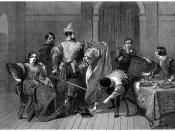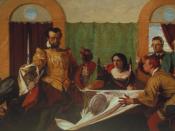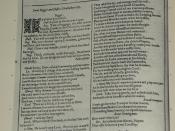Transformations
"The Taming of the Shrew", written by Shakespeare in the 16th century explores the values and ethics of people living in the Elizabethan period, focusing on the financial advantages of marriage. Now, over four centuries later, Shakespeare's work is still being enjoyed by our contemporary society through the film "Ten Things I Hate About You", the tale of two mismatched sisters with an overprotective father. Because these texts were written in different contexts, they have different means of production, but follow a similar narrative structure. Shakespeare uses Narrative Techniques to shape and convey meaning while Gill Junger uses Cinematic Techniques for communication with the audience.
"The Taming of the Shrew" follows the story of two sisters, Bianca and Katherina who could not be more different. Katherina is a quick-witted, stubborn, sharp-tongued woman who is starved into submission by Petruchio, a young man marrying Kat purely for financial reasons.
Shakespeare uses many dramatic techniques to shape and convey meaning to the audience of this time, primarily focusing on Language. Three especially dramatic techniques are hyperboles, similes and imagery.
Gremio speaks a very obvious hyperbole when describing Bianca: "For she is sweeter than perfume itself". This overstatement creates the atmosphere of beauty, divinity and feminism. As this is a play, themes and motifs are not easily portrayed visually, explaining Shakespeare's intense use of emotive language. The theme of romance is presented to the audience. However, our views on romance today are much different than those of the Elizabethans. Romance involves the attachment of both parties, not just that of the males.
"The Taming of The Shrew" is saturated with similes, encouraging the reader to visualize the images being portrayed. Pertruchio uses a string of Similes in response to the warnings he receives concerning Katherina: "Be She as foul...


